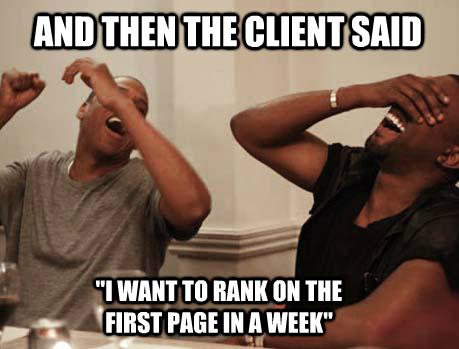SEO Goes East: Negative Attitude towards SEO and Search for New Alternatives (Part I)
Introduction
Surviving in a business world is not an easy thing, especially when you try to run an online business and therefore take on two burdens: business and networking. Even the most developed and stable economies are making it harder for businesses to survive. That is why more and more businesses are turning their attention to SEO and other opportunities Internet can give.
In the following circumstances, the attitude to SEO plays crucial role in the overall development of online business. Unlike analytics with plenty of different graphs showing how a particular ad campaign is going, attitude cannot be modified through a piece of code or measured by any magnitude. A positive attitude is an essential part of the overall SEO success and its effective implementation.
To form a positive attitude towards SEO, we will reveal the main reasons of a negative attitude it provokes and how we can overcome them to satisfy our clients and therefore to expand our client base.
Why SEO is "Bad"?
SEO receives a serious amount of negative feedback in the countries of Western Europe, United States, Australia and the number of other regions of the planet. However, together with a plenty of dissatisfied people, there are people that still believe in SEO and say that it worked for them. Such diametrically opposite feedbacks has a series of reasons that can be divided into two main groups:
1. Mistakes that SEO agencies make
SEO agencies are considered to be the expert side of this process. That is why they have more responsibility and mistakes made by SEO agencies are considered more serious, more complex and more influential. To identify the main mistakes that SEO specialists are making nowadays, we have asked a series of SEO experts and businessmen from United States, United Kingdom, Australia, Canada, Austria, India, France, Germany and other EU countries. Let's try to identify the key mistakes SEO agencies make that harm the general attitude to this sphere in US.
- Giving up on SEO
A lot of agencies have been seriously hurt in 2014 when Google rolled out Panda and Penguin algorithm updates, which was followed by Google Hummingbird in 2013. The current changes have seriously reshaped the way SEO is practiced. For sure, a lot of marketers weren't able to successfully deal with that shift. At that period, a lot of marketers completely gave up on SEO and focused all their attention on social media or contextual advertising. And still there are companies and marketers that were unable to adapt to SEO changes and therefore feel negative about doing it. However, their negative attitude is reasoned by their own lack of professionalism and skills, not by the real effectiveness of SEO.
- Poor quality of staff
This point is partly a continuation of the previous one. A great number of people have formed their negative attitude to SEO based on the prior experience of spending money on SEO agencies that gave them backlinks that were fairly a pure crap. In this situation, all the client knows is that he/she spent a lot of money on SEO and got nothing in return. Even if such companies are lucky enough to cooperate with a good SEO agency, they for sure have no opportunity and desire to spend a lot of money on SEO and to do SEO at all.
- Poor quality of service
You will be surprised by how many agencies just don't pay proper attention to SEO when elaborating a digital marketing agency. Focusing on SEO is as important as the other channels, such as content marketing, social media marketing, email, advertising, etc. Ignoring any of the current channels is unwise because lopsided strategy won't take you to the first page in SE.
- Lack of attention & individual approach
It is obvious that the more clients you have, the better. SEO agencies try to expand their client base and while receiving new orders, they can forget about hiring new people. That is why sometimes quantity is put over quality that seriously harms the overall effect of provided SEO.
- Not pre-qualifying clients
Pre-qualifying clients is a must-do for SEO agencies in order to work only with those clients that fit their company and therefore escape a lose-lose situations. First of all, it is important to remember that without a clear definition of your potential client you are not ready for doing SEO. Not all clients that contact you are the ones that will benefit from your cooperation and therefore you won't benefit from them as well. The criteria for this process may vary from agency to agency, but in general they depend on the agency's expertise, resources and projects it wants to work with.
2. Mistakes that clients make
- Making stance on one aspect of digital marketing strategy
Although SEO is important and it is necessary to make it one of the main element of the overall digital marketing strategy, only the combination of all basic elements will make your strategy work. For sure, SEO is important, so make stance on it as a vital part of your digital marketing agency, as should all other channels, including social media, email, content marketing, advertising, etc.
- Gotten burned in the past
The vast majority of SEO marketers state that their clients don't believe in SEO because of their prior experience. When you come to SEO agency for the first time, you are informationally vulnerable because you have no frame of reference for the proposed services, pricing and timing. That is why there is a high possibility of receiving a low quality service or just not the one you really needed. Moreover, after the serious changes of how SEO works in 2012, the old marketing strategies became ineffective and therefore
- Wrong expectations
Inaccurate information or its absence make clients expect SEO to be something that it is not or to change things in a way it cannot, and is not always the duty of the agency to correct such misconceptions. A lot of clients that do not have the ability to afford large budgets still want to receive large-budget SEO services, or they want SEO to do the job of other elements of digital marketing strategy, such as content marketing or advertising. So they expect to receive these results even if they are not covering the required amount of labour hours and other expenditures connected with made efforts, such as link building, interacting content marketing, etc. It is like paying for Toyota Yaris when expecting to get a BMW X5. It is possible to try to get their expectation back to reality, but such clients will probably end going to another agency that promises and doesn't deliver, because sometimes people do not want to hear the truth.
- Lack of knowledge
Unfortunately, business owners aren't spending enough time on self education about what SEO actually is and how it is done. That is why when they are too trusting when coming to the first person who says “I know SEO” - they don't know what questions the need to ask and what requirements they have to put forward. This seriously harms the quality of individual approach because every client is different and it is necessary to correctly define his individual proposition value. The lack of knowledge also prevents clients to adequately assess the time and cost of services. SEO takes time and therefore it cannot be cheap. This takes us to the next widespread mistake a lot of business owner do.
- Trying to get it done on the cheap
In case you have an online business with a developed public profile and you want to grow your rates, you have to pay for that. The majority of marketing agencies lose as much as 80% of consulted clients at the stage of pricing discussion. A lot of clients got burned because they have worked with incompetent cheap specialists in the past. Such decisions end in spending all company's SEO budget on low quality backlinks and depersonalized approach. Moreover, SEO cannot be done once and forever: this is not how to works. Therefore, if you want to get a serious result - include a new expenditure item in your budget. However, making a serious investment will give you actual results that will justify all the efforts.
Looking for Alternative: Going East
After the observation of the most widespread mistakes that lead to the formation of SEO's negative image, a question arises: "Where to find a positive alternative that will bring back to SEO its real value and give clients what they really need?" Here is a place for a real break up news: when it's not going right on the West. turn to the East. European region is currently the most powerful market with people that are active on the web more than any other part of the world with the leading users search rates among all continents. Europe is 731 million of prospective clients and marketers that are used to working in really tough conditions. The unbelievable lingual and cultural diversity has made European SEO really good at elaborating individual approach to each client and working with different target audiences. Special attention should be paid to the region of Eastern Europe, because nowadays it shows the best dynamics of market growth and development. Eastern European marketing agencies that successfully cope with competition with Western conquerors are showing excellent results in SEO and PPC that is supported by the feedback from international companies that work within the region, experts and specialists.
1.If you want SEO to give you real results - get ready to implement agent's technical projects.
To get maximum growth of search traffic, you have to work on your website. Forget about purchasing links, cheating behavioral factors or looking for gaps in search engines and concentrate on internal optimisation. Thus, the key point of SEO is to implement the technical tasks of SEO-optimizers. What's interesting, the reverse is also true: if nothing is implemented, then the search traffic growth is almost negligible. So, what does that stands for? Get ready to stop fighting, arguing, persuading, but to suggest and then to implement experts' recommendations in the framework of constructive debate. If you are arguing for the sake of argument and refuse to implement the recommendations, you don't need SEO at all.
2. SEO - long distance race
Don't be fooled expecting for the quick-impact SEO. In case client is first intensively implementing technical tasks, and then stops the work with the project because the one doesn't see the results, this can lead to the following results: 

3. A marketer has to be on client side in-house.
Of course, it can't be done without a programmer that will implement technical finalizations of the website, and a copywriter or content manager, who will systematically fill your site with useful content. You should have this type of employees. It doesn't matter whether they are full-time or part-time ones. But the one who has to be on client side in-house - is the marketer. It's because he has to not just be close to business, but to be inside it - to be deep enough to understand the tiniest nuances of company specifics. This person is responsible for implementation of the promotion strategy. In fact, he is a decision-maker. The owner is often too busy, and the marketer can handle competently setting the goals,writing response emails, discussing the campaign, facing criticism and reacting on it. So, it is markete that should be entrusted to manage all outsourcing employees from the client's office. We get the following message from a previous sentence:
4. A SEO specialist has to do SEO, a context specialist has to do PPC, and SMM specialist - SMM. And the marketer has to supervise and direct them.
We have repeatedly seen at first hand: the emphasis on narrow specialization determines financial strength of the business. Services of subject matter experts are more qualitative and therefore more expensive.
Each specialist has to do his job: to be competent in particular industry and look for a personalized solution to customer problems. At the same time, marketer needs to understand the working principle of each of the professionals to be able to effectively manage them. 
5. The presence of staff specialists does not negate cooperation with the agency
Big clients are often choosing between the “agency” and “in-house”. It is quite normal for a certain evolution branch of the market of Internet marketing. But the ultimate and the most effective format is the in-house and agency synergy. The Agency is always faster, more energetic, more aware of the innovations and features, has more diverse experience and goals, is able to squeeze 80% of the result out of 20% action, has the technologies, pinkies and so on, but it can hardly take into account all the business details perfectly, and can is unlikely to clearly convey the position to those "for whom the result has to matter." On the contrary, in-house is always closer to business and it takes into account more features of the inside kitchen. He is supposed to sweep the context, but in fact when it is getting warm and comfortable in-house, the specialists can degrade because of boredom, monotony, or the absence of kicks/ goals/ other experience. Therefore, we recommend that major projects work in the "in-house + agency" and not "agency vs. in-house".
6. If you work with contextual advertising and receive more than 30% of complaints via calls, make sure to use call tracking
It is necessary to analyze website calls sources to understand which advertising channels is working effectively (external or Internet advertising, and exactly what types of it). Where the context budget is over $ 1,000 a month and where more than 30% of applications from the website come via calls — here, call tracking is required. In other cases you should think about the decision you'll make, weighing all the "pros" and "cons". 
- Have left the call without response;
- Have been rude with the client;
- Haven't offered the client to place an order;
- Couldn't clearly explain the basic features of the product;
- Haven't proposed an alternative to a product the client searches for.
To prevent such situations it seems logical to use the whole toolbox of call analysis services.
7. SEO and Contextual advertising — not interchangeable, but complementary sources.
Why can't work for positions? Promotion goes by the limited keywords list:
- Quite unnatural process in the eyes of search engines;
- Creates boundaries for business development within the whole range of products.
For further details, go to Google Support. High quality SEO allows to seriously improve inside website indicators and also receive additional target traffic on low-frequency search queries. Moreover, context can always be included or excluded the moment it is required. 
8. A part of your contextual advertising budget has always be spent on testing new sources.
There is a chance for each theme: it is possible that the source (strategy, trick), which doesn't work everyone else, will work for you. Testing allows you to identify such source and get the maximum use out of it. Even when everything has already been set up and is working perfectly, you still have to test no matter what. Don't be stopped by the possibility that a part of money will go down the drain in case testing doesn't give the desired results. Knowing effective and ineffective sources is a result itself. You definitely have to test new instruments, hypotheses and competitors' methodology. Allocate budget for your specialists to conduct testings so they won't worry when using it.
9. You have to set goals knowing your sales vortex
Goals being set without vortex are most likely to fail the expectations of SEO or/and contextual advertising. Only by correct calculation of sales vortex and calculating the exact cost of new client attraction, it is possible to manage strategically the advertising campaign and receive a maximum benefit from it.
Sales vortex - principle of potential clients division in accordance with the stage of the whole process starting from the first contact to selling the product or service.
Conclusion
We understand that big projects have to deal with big problems. They have to form a team of professionals, develop the best product/service within the market, resolve a legal aspect, seek for investors, maintain records and many other things Moreover, all of the mentioned above is followed by the complexities with online promotion. It can be generalized in a nutshell: clients order SEO promotion and PPC within the agency and forget about it. As a result, the specialists of the agency fulfill the required tasks and… nothing happens. Money and efforts are wasted: client loses his/her money, the agency loses its regular satisfied customer and motivation within the team that did everything they could. What do such things happen? That's because the market is suffers from the gym syndrome.  Client understands that he has to develop his business but as soon as it turns out that to achieve this goal you have to make an effort yourself, all his enthusiasm disappears. Not the last role here is played by the stereotypes formed because of low quality services and the approach to the provision of these services. The aforementioned nine messages will become a small, but useful instruction for clients oт how to refer to SEO. There is a serious number of arguments for and against such services, and the majority of them are based on real life experience. That is why we decided to conduct a deep research and collect all arguments that reveal the hidden side of this service - to give you the ability to look at it from a different aggle and see SEO in another light. In case you have had a bad experience - don't stop, seek for alternative decisions, nonstandard decisions and don't be afraid to try SEO once more.
Client understands that he has to develop his business but as soon as it turns out that to achieve this goal you have to make an effort yourself, all his enthusiasm disappears. Not the last role here is played by the stereotypes formed because of low quality services and the approach to the provision of these services. The aforementioned nine messages will become a small, but useful instruction for clients oт how to refer to SEO. There is a serious number of arguments for and against such services, and the majority of them are based on real life experience. That is why we decided to conduct a deep research and collect all arguments that reveal the hidden side of this service - to give you the ability to look at it from a different aggle and see SEO in another light. In case you have had a bad experience - don't stop, seek for alternative decisions, nonstandard decisions and don't be afraid to try SEO once more.
Recommended theme posts
Related Articles
How to Link Google Ads to Google Analytics 4: A Step-by-Step Guide
Learn more about your target audience and improve your advertising campaigns by taking full advantage of Google’s tools.
Email Bounce Back: Strategies to Overcome Email Delivery Challenges
How do you deal with high bounce rates and make your campaign more effective? I will explain and show you tools for email verification
Text ASO and CRO Loop Strategy for vidby MeetUP: Boosting App Impressions by 3,018% and Installs by 138% in a Month



